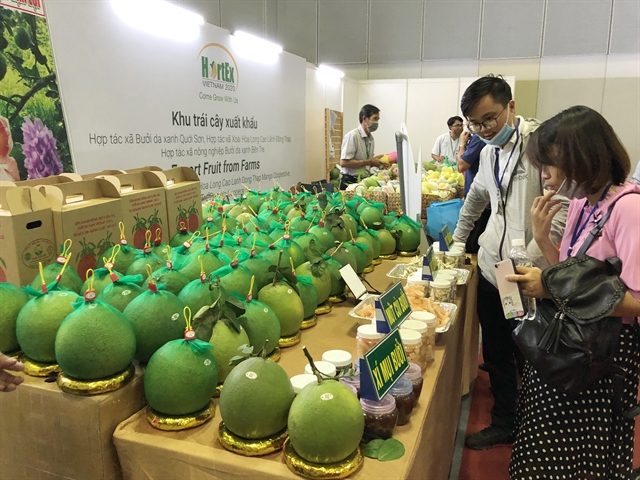Africa and the Middle East offer opportunities for Viet Nam to boost exports of farm produce with their large demand, especially for fruits and vegetables, according to the Ministry of Industry and Trade.

Africa and the Middle East offer opportunities for Viet Nam to boost exports of farm produce with their large demand, especially for fruits and vegetables, according to the Ministry of Industry and Trade.
Nguyen Minh Phuong of the ministry’s Asia-Africa Market Department said the per capita income in the Middle East is relative high.
Countries in the region mainly focus on industry, and import large volumes of agricultural products, she said.
“The Middle East has very high demand for fruits and vegetables.”
Viet Nam’s fruit and vegetable exports to the region have shot up in recent years, rising from US$44.8 million in 2015 to $96.9 million in 2018, but remain very low as a ratio of total imports, she said.
“The Middle East attracts a large number of Asian workers, and so demand for tropical fruits and vegetables will further increase. Fruit and vegetable exports are expected to grow further in the coming years.”
Africa too has huge demand for agricultural products, mainly rice, seafood, fruits and vegetables, but because of the distance, it is not easy for Vietnamese firms to export fresh fruits to this market though they can sell canned fruit juices and sugar coated fruits, she told an export forum held on the sidelines of Hortex Vietnam 2020 in HCM City on February 27.
Viet Nam has exported fruits and vegetables to 46 out of 70 countries in Africa and the Middle East, with the main markets being the UAE, Saudi Arabia, Turkey, Egypt and South Africa, she said.
Vietnamese firms should focus on exporting watermelon, passion fruit, mango, longan, rambutan, and dragon fruit besides juices to the UAE, she said.
Viet Nam’s fruit and vegetable exports to Saudi Arabia are worth only around $3 million, and exporters need to do market research since consumers in the country prefer sweeter foods than in other markets, she said.
They could export watermelon, mango and sugar-coated fruits to the country, she said.
The South African agricultural sector is strong, but its fruiting season is different from Viet Nam’s, she said.
It has enormous demand for oranges, mangoes, litchi, rambutans and dragon fruit, she said.
She warned Vietnamese firms about challenges they would face when exporting to Africa and the Middle East, including fierce competition and payment methods that are not convenient for them.
They might have less stringent quality requirements compared to many other countries, but to succeed in exporting to them, Vietnamese firms must have long-term strategies, improve product quality and study the market carefully, she said.
They should also understand the regulations in each market and Muslim cultural factors, and need to have labels in local languages, she said.
They need to pay more attention to building brands and increasing the processing rate to add value to Vietnamese fruits and vegetables, she added.
Traditional markets
Dr Le Thanh Hoa, deputy director general of the Agro Processing and Market Development Authority, said fruit and vegetable exports have increased enormously in recent years to reach over $3.8 billion last year.
The market for Vietnamese fruits and vegetables has expanded to 60 countries and territories, including selective ones such as the US, South Korea, Japan, the Netherlands and Australia, he said.
The global fruit and vegetable trade is expected to reach $320 billion this year, and this means Viet Nam has a tiny market share, and so there is much room for the country to increase exports, he said.
But Vietnamese firms should focus more on improving product quality, food hygiene and safety to boost exports to traditional markets like Japan, South Korea, the US and the EU.
They need to pay more attention to Russia and Southeast Asia, he said.
In the case of exports to China, exporters need to switch from border trade to official exports, he said.
In an interview with the media, Willem Schoustra, agriculture counselor at the Netherlands embassy in Ha Noi, said: “Viet Nam has a big ambition of becoming a large agricultural player globally. The challenge for Viet Nam is to work on vertical value chain improvement and processing.”
The free trade agreement between the European Union and Viet Nam could boost exports from both sides, he said.
The sector needs to “find the right investors to increase the volume of processing and develop the whole value chain and branding, packaging and also post-harvest techniques so that the products will have the longest shelf life after harvest,” he said.
The potential for exporting fruits and vegetables to the Netherlands is huge, and a lot is already shipped to the Netherlands and the rest of Europe, he said.
For instance, Viet Nam sells pomelo and lime to the Netherlands, he said.
But to further exploit the potential the European market offer, Vietnamese exporters need to improve the quality of the products, he added. — VNS





